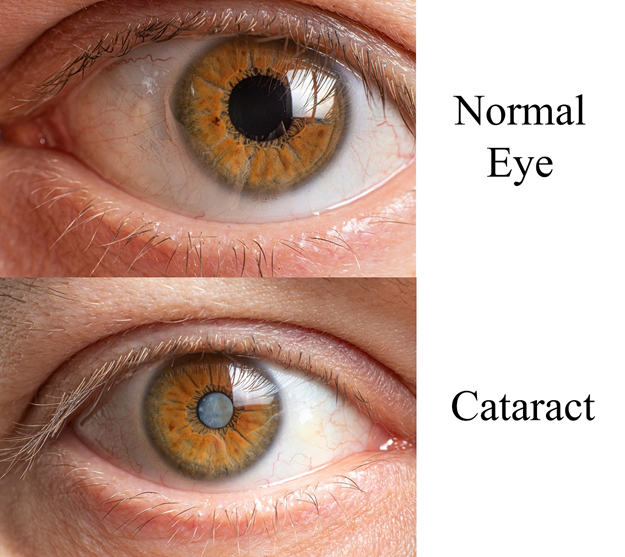-
+917899203980
Phone line
-
rithikassurgicalandeyeclinic@gmail.com
Email address
-
JP Nagar, Bengaluru
Visit us

Cataract Eye Surgery
A Cataract is clouding of the eye's natural lens, which in turn causes deterioration of vision. It is a
natural process of aging of humans. Every person gets it, sooner or later as per his age, health and
fitness. The natural lens in the eye is made mostly of water and protein. As the lens ages, the
protein it is made of degenerates and becomes cloudy. This blocks some light from reaching the retina
and interferes with one's vision to see properly. Cataract is not a disease.
Cataract Eye Surgery is a common surgical procedure that is performed to remove a clouded lens
(cataract) in the eye and replace it with an artificial lens. This procedure is typically performed
on patients over the age of 60 who have experienced vision loss due to cataracts.
At our clinic, we specialize in providing cataract eye surgery to patients who are experiencing
vision loss due to cataracts. Our team of highly skilled and experienced surgeons use the latest
technology and techniques to ensure that our patients receive the best possible care.

What Are The Causes?
Most cataracts develop when aging or injury changes the tissue that makes up the eye's lens. Proteins and fibers in the lens
begin to break down, causing vision to become hazy or cloudy.
Some inherited genetic disorders that cause other health problems can increase your risk of cataracts. Cataracts can also be
caused by other eye conditions, past eye surgery or medical conditions such as diabetes. Long-term use of steroid medications,
too, can cause cataracts to develop.
Cataract Surgery Recovery Time
Recovery from cataract surgery is quick and easy as long as you don’t have any other major eye condition. The whole process takes about 10 to 15 minutes but you will have to rest for about an hour after it. Your chances of a good vision after this surgery are very high. You will be given protective glasses to be worn for a few days to protect your eyes from bright light and dust.
It is normal for your vision to seem a bit blurry or cloudy for some time because it takes a while for your eyes to adapt to the new lens. There are even chances of developing red eyes because of the temporary damage caused to your blood vessels. However, this is completely normal and will heal as your eyes heal within a few days. There are some patients who even report clear vision in just a few hours after surgery. Healing is an individual process and is different for different people. So even if it takes a week or two longer for your eyes to see clear images, there is no need to panic.
Frequently Asked Question's(FAQ's)
1. What Happens When I Come To The Hospital For A Checkup?
During your visit to our hospital, you will first be taken through a routine checkup of your refraction by a team of qualified optometrists. This will be followed by a Slit-lamp examination and a dilated Retinal examination by a consultant.
2 . Do I Have Cataract?
You may, if you are over 40 years of age and have blurred vision, light sensitivity or glare, poor night vision or fading of colors. These symptoms may differ based on the sub type of cataract.
3. Is Phacoemulsification Long And Painful?
No, the procedure is a simple day care one. The area surrounding your eye will be cleaned, and sterile drapes will be placed over you, exposing only the eye to be operated on. You might have a local anesthetic, which involves a small injection around your eye to keep the eye muscle relaxed during surgery or just drops instilled in your eye to numb it. This makes the surgery completely pain free. The whole process is usually under 10 to 15 minutes.
4. What Do I Need To Do Before The Cataract Surgery?
It is good to wash your face thoroughly with soap and water before coming for surgery. Use the antibiotic eye drops prescribed to you before the surgery. You can eat a light breakfast on the morning of the surgery.
5. What Happens After The Cataract Surgery?
After surgery a bandage or shield will be placed over your eye. You can resume normal, moderate activity as soon as you feel up to it. You should wear protective glasses while going out during the first week. You can bathe carefully from below your neck but do not wet the operated eye for 15 days. You are advised to gently clean the eyelids with a piece of cotton boiled in water or a sterilized tissue. There are no diet restrictions following the surgery.
6. How Long Do I Have To Stay In The Hospital After My Cataract Surgery?
You can return home soon after your cataract operation. Surgeon will see you before discharging. However, if you desire to stay back with an attendant you can stay overnight in comfortable inpatient rooms at no extra charge.
